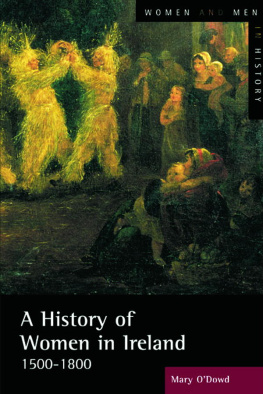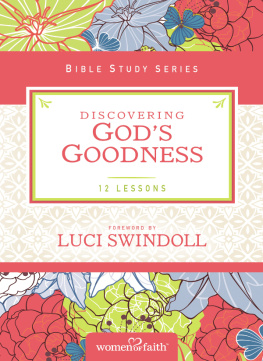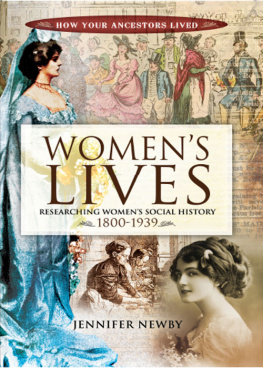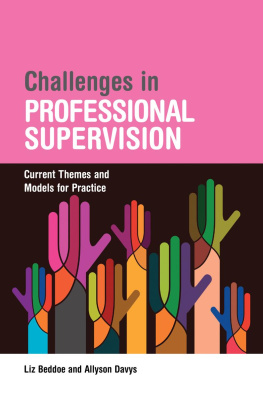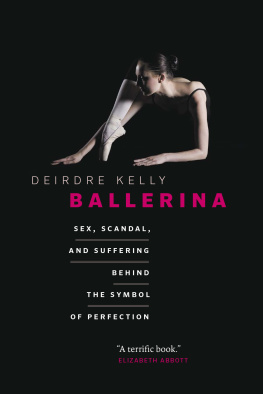Discovering Womens History
Deirdre Beddoe is Emeritus Professor of Womens History at the University of Glamorgan, Pontypridd. She has taught in secondary schools and is an experienced lecturer in Womens History and Womens Studies in continuing and higher education. She has worked in film, television and radio. Her books include Welsh Convict Women (1979), the story of women who were transported from Wales to the Australian penal colonies, and Back to Home and Duty: Women between the Wars, 19181939 (1989), which looks at how women in Britain were persuaded and coerced to become housewives and mothers in the inter-war years. She is co-editor of Parachutes and Petticoats: Welsh Women Writing on the Second World War (1995) and is currently writing a history of women in twentieth-century Wales.
First published by Pandora 1983
Second edition published 1993
Third edition published 1998
Published 2014 by Routledge
2 Park Square, Milton Park, Abingdon, Oxon OX14 4RN
711 Third Avenue, New York, NY 10017, USA
Routledge is an imprint of the Taylor & Francis Group, an informa business
Deirdre Beddoe 1983, 1998
The right of Deirdre Beddoe to be identified as author of this Work has been asserted by her in accordance with the Copyright, Designs and Patents Act 1988.
All rights reserved. No part of this book may be reprinted or reproduced or utilised in any form or by any electronic, mechanical, or other means, now known or hereafter invented, including photocopying and recording, or in any information storage or retrieval system, without permission in writing from the publishers.
Notices
Knowledge and best practice in this field are constantly changing. As new research and experience broaden our understanding, changes in research methods, professional practices, or medical treatment may become necessary.
Practitioners and researchers must always rely on their own experience and knowledge in evaluating and using any information, methods, compounds, or experiments described herein. In using such information or methods they should be mindful of their own safety and the safety of others, including parties for whom they have a professional responsibility.
To the fullest extent of the law, neither the Publisher nor the authors, contributors, or editors, assume any liability for any injury and/or damage to persons or property as a matter of products liability, negligence or otherwise, or from any use or operation of any methods, products, instructions, or ideas contained in the material herein.
ISBN 13: 978-0-582-31148-0 (pbk)
British Library Cataloguing in Publication Data
A catalogue record for this book is available from the British Library
Library of Congress Cataloging-in-Publication Data
A catalogue record for this book is available from the Library of Congress
Set by 35 in 11/12pt Adobe Garamond
I am pleased that this third edition of Discovering Womens History has been published by Addison Wesley Longman. It is fifteen years since the first edition appeared and during that time it has been very widely used. Womens groups, local history societies, television and film researchers, sixth formers and their teachers, undergraduate and postgraduate students have drawn on its guidance and advice in conducting their historical investigations in all parts of the United Kingdom and in Ireland. The wide usage of the earlier editions is a testimony to the great enthusiasm which exists for the task of rescuing the hidden history of women.
My aims and objectives remain the same. Above all, Discovering Womens History is intended to encourage people to carry out research projects, particularly in their own home areas, and to break down the elitist mystique which for so long surrounded the term historical research. This book is essentially practical: it aims to provide clear advice on how to locate and how to use the sources of womens history. It is based on the firm belief that only through many local and regional studies can we begin to construct a national picture of English, Irish, Scottish and Welsh womens lives in the past.
Womens history has made enormous progress in the years since the publication of the first edition of Discovering Womens History. In particular, it has grown and developed as an academic subject in schools, colleges and universities. So too the number of students studying it has multiplied and for this reason, this third edition is particularly focused towards student needs, while still continuing to serve the interests of a wider community of readers. I have made several important changes to the third edition with students in mind.
The introduction has been revised. Chapter one is completely new and addresses the issue of actually doing a research project and writing a dissertation, giving guidance from the initial task of selecting a research topic to the final presentation of the finished project. The rest of the book has been substantially revised. The booklists have all been updated and expanded to reflect current scholarship in womens history and much of the information on the location of the sources has had to be altered: in recent years many record collections have found new homes and whole libraries have moved. The list of useful addresses, which appears as an Appendix at the end of the book, has been also brought up to date.
Many people have helped me over the years in the preparation of Discovering Womens History and I am greatly indebted to them. I particularly wish to thank for their contribution to this edition Ursula Masson and Avril Rolph of the University of Glamorgan; David Doughan of the Fawcett Library, whom I continue to regard as the repository of all knowledge; the archivists and staff of the Modern Records Centre at Warwick University, the National Museum of Labour History in Manchester, the Trade Union Council Library Collection in the University of North London, the National Library of Wales, the Learning Resources Centre at the University of Glamorgan and the Library of the University College of Cardiff. I owe a particular debt to my long-standing agent, Mandy Little of Watson, Little Ltd; to Hilary Shaw, Commissioning Editor at Addison Wesley Longman and to Terka Bagley, editor of this edition. Finally, as always, my thanks go to Christine Lee and Kathleen Durbin for all their support. Any errors are, of course, entirely my own work.
Deirdre Beddoe
Penarth, October 1997.
The publishers would like to thank the following for granting permission to reproduce illustrative material: Glasgow Museums for .
While every effort has been made to trace the owners of copyright material, we take this opportunity to offer our apologies to any copyright holders whose rights we may have unwittingly infringed.
When I first asked this question, in the 1970s, I did so against a background where some male academics seriously asked, is there a history of women? Others, while conceding that there might be such a thing, dismissed it as impossible to find out about: there are no sources, they used to say. Womens history has come a long way since then. You can study it in colleges and universities; the national curriculum has put it, albeit in a limited way, on the agenda in schools; a whole publishing industry has grown up around womens studies, of which womens history is a significant strand: television programmes, too, reflect the public appetite for knowledge about womens lives in earlier times. The subject has made great advances in a short time but there is still a long way to go. In fact, the question why should we study womens history? is as relevant now as it was then but the answers must be geared directly to womens situation today. This book invites readers to research local womens history and, as such, to take on a lot of work. We therefore need to consider a further question: why should we study local womens history? In this chapter I want to address both questions. I also wish to examine the current state of womens history in Britain and to outline a plan for its future development. Individuals and local groups will see not only how they fit into the scheme of things, but how vital their contribution is.



